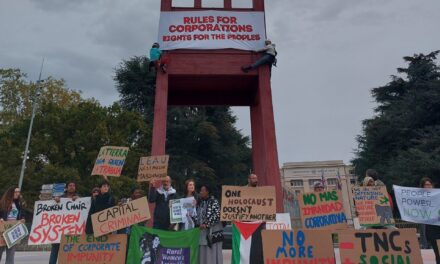EPW Letter from America — May 6, 2006
On April 18, at a White House press conference, president George Bush was asked "when you talk about Iran, and you talk about how you have diplomatic efforts, you also say all options are on the table. Does that include the possibility of a nuclear strike? Is that something that your administration will plan for?". President Bush replied: "All options are on the table."
In the April 17 issue of the New Yorker magazine, veteran reporter Seymour Hersh claimed that "intensified planning for a possible major air attack" had begun and that "Air Force planning groups are drawing up lists of targets, and teams of American combat troops have been ordered into Iran, under cover, to collect targeting data". Hersh revealed that "One of the military's initial option plans, as presented to the White House by the Pentagon this winter, calls for the use of a bunker-buster tactical nuclear weapon, such as the B61-11, against underground nuclear sites". A Pentagon advisor told Hersh of a "resurgence of interest in tactical nuclear weapons among Pentagon civilians and in policy circles".
These reports have rightly stirred many fears. Many believe the Bush administration is trying to repeat the strategy it used for mobilizing public support for the war on Iraq. Zbigniew Brzezinski, the hard line former national security advisor, was moved to write in the Los Angeles Times on April 23 that:
"If there is another terrorist attack in the United States,you can bet your bottom dollar that there also will be immediate charges that Iran was responsible in order to generate public hysteria in favor of military action."
Brzezinski also pointed out that a US attack on Iran "in the absence of an imminent threat…would be a unilateral act of war." He argued that: "If undertaken without a formal congressional declaration of war, an attack would be unconstitutional and merit the impeachment of the president. Similarly, if undertaken without the sanction of the United Nations Security Council, either alone by the United States or in complicity with Israel, it would stamp the perpetrator(s) as an international outlaw(s)."
But there is little reason to be surprised by all this. An attack on Iran would fit nicely in the long history of US practice. It has bombed and invaded repeatedly without authorization of the Security Council. The US has been, to borrow Brzezinski's term, an "international outlaw" for a long time.
The refusal to live within the law is in fact such a standard part of US foreign policy that it goes unremarked in official and elite discussions. It is now common to hear American policy-makers and pundits talk casually of using "carrots and sticks" to get other countries to change their policies, and the debate is about the proper balance between the use of bribes and threats to achieve policy goals. There is no recognition that the threat to use force is an explicit violation of the UN charter; Article 2.4 of the UN charter is categorical – "All Members shall refrain in their international relations from the threat or use of force against the territorial integrity or political independence of any state."
There is no reason to be surprised either about possible US plans to use nuclear weapons in an attack on another country. The US has always had a declared policy of being prepared to use nuclear weapons first in a conflict. The US has also made clear repeatedly that it would use nuclear weapons even against countries that do not have them.
The fact is that US political leaders, military planners and nuclear weaponeers have often thought of using nuclear weapons for fighting wars. The first use of nuclear weapons, against the Japanese cities of Hiroshima and Nagasaki, was proof of that. A year later, the first nuclear threat was made. President Truman, who had ordered the atomic bombing of Japan, threatened the Soviet Union (which had been a US ally during second world war and did not have nuclear weapons) with nuclear attack if it did not withdraw its troops from Iran.
These founding moments of the nuclear age should have put to rest any notion that nuclear weapons are only for deterrence. Writing in 1981, Daniel Ellsberg, who worked on US nuclear war planning in the early 1960s, observed that "every president from Truman to Reagan, with the possible exception of Ford, has felt compelled to consider or direct serious preparations for possible imminent US initiation of tactical or strategic nuclear warfare, in the midst of an ongoing, intense non-nuclear conflict or crisis."
To take just one example, the US military seriously considered using tactical nuclear weapons in the Vietnam war. Declassified documents show that in February 1968, the chairman of the US joint chiefs of staff considered the question of "whether tactical nuclear weapons should be used" if it looked like the Vietnamese might succeed in their attack on the US troops at Khe Sanh. He asked US commanders in Vietnam to look for targets "which lend themselves to nuclear strikes". The documents show that senior military commanders argued that "military prudence alone requires that we do some detailed planning," set a planning process in motion, and considered the "type and location of tactical nuclear weapons available and best suited to the purpose."
Nuclear weapons were eventually not used in Vietnam. General Westmoreland, the commander of US forces in Vietnam, later argued that the use of nuclear weapons could have forced the Vietnamese to surrender, and drew an analogy with the atomic bombing of Japan. Other people, and not just in the US, have had similar dreams of what the proper use of nuclear weapons might achieve.
Against Iran
The US plan, or "option", to use nuclear weapons against Iran is directed against what some believe to be a possible secret Iranian nuclear weapons programme. President Bush has said that "we do not want the Iranians to have a nuclear weapon, the capacity to make a nuclear weapon, or the knowledge as to how to make a nuclear weapon." It would be "intolerable", he said.
This begs the question, what is so special about Iran. After all, any country with a basic scientific capability now has the knowledge of how to make a nuclear weapon. And, a significant number have the capacity to make nuclear weapons. They choose not to. Only eight countries in the world (possibly nine if one includes North Korea), out of the 191 states that are members of the United Nations, actually have nuclear weapons. They are the anomalies, not the norm.
It is easy to understand why the US does not want other countries to get nuclear weapons. As a Bush administration official explained to a writer for the New York Times in 2003, the problem with the Bomb was that "It is a real equalizer if you're a pissant little country with no hope of matching the US militarily".
But not every country is a concern. Nuclear weapons and the capacity and knowledge to make them are more of a problem for the US in some places in the world. An insight into the geography of America's current nuclear fears was offered in a 2005 article in the Financial Times, by Michael May, the director emeritus of the Lawrence Livermore National Laboratory (America's second major nuclear weapons laboratory) and Michael Nacht, former assistant director of the US Arms Control and Disarmament Agency in the Clinton administration. They explained that:
"Since the cold war, the top US military priority, as stated in congressional testimonies, has been to deploy the world's most effective power projection forces. These forces have been used in the Balkans, the Persian Gulf and central Asia. A power projection force operates in or near hostile territory…Any power projection force needs air bases and ports of debarkation and logistics centers for sustained operations. These facilities must be rented or conquered. Their number is limited – a handful in Iraq, and not many more in east Asia, seven or so in Japan, some bases in South Korea, and a few others. These facilities are highly vulnerable even to inaccurate nuclear missile attacks. They are "soft targets", not "hardened" against nuclear weapons…The nuclear threat to essential US force-projection assets largely counterbalances the advantage provided by US conventional forces."
Threat to America
In short, the spread of nuclear weapons to some key parts of the world threatens America's ability to use its otherwise overwhelming military power in those areas. What this explanation omits of course is any mention of why the US wants to project military power in these particular places in the world. In the case of Iran, as with the case of Iraq, the answer should be obvious.
But, truth be told, there is an even greater obstacle than the Bomb to America's ability to successfully impose its will through military power. It is one that American leaders, and those in all the other nuclear weapons states, know only too well but cannot admit to. It is the organized resistance of people defending their right to be free. This, as Jonathan Schell put it in his book The Unconquerable World, is the power that "has enabled poorly armed or unarmed or entirely non-violent popular movements to defeat the military forces of the most powerful empires of the past two centuries".
The limitations of American military power have been exposed repeatedly over the 60 years that it has had nuclear weapons. One need only recall the American wars against Korea, Vietnam, Afghanistan and now Iraq. Millions have died in these wars, including many thousands of Americans. The use of military power has carried other costs for the US. This year, the wars in Afghanistan and Iraq will cost as much money as the US spends on its departments of education, justice and homeland security combined. The cost of the war in Iraq alone will reach some $ 320 billion after Congress approves another emergency funding bill next month. The Soviet Union, the other great "superpower", did no better. Its vast military machine could not stop it from falling apart once its people, and those it ruled in eastern Europe, decided enough was enough.
Let us leave the last word to someone who was responsible for planning nuclear war for the US. General Lee Butler was commander in chief of the US Strategic Air Command and then of the US Strategic Command with responsibility for all US nuclear weapons. Butler has explained why the US keeps nuclear weapons and insists on its right and willingness to use them. He writes:
"I have no other way of understanding the willingness to condone nuclear weapons except to believe that they are the natural accomplices of visceral enmity. They thrive in the emotional climate born of utter alienation and isolation. The unbounded wantonness of their effects is a perfect companion to the urge to destroy completely. They play on our deepest fears and pander to our darkest instincts."
Email: [email protected]









